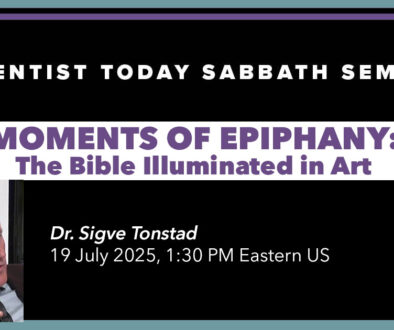Authority vs. Experience: What Shapes Christian Identity?
23 June 2022 |
When famous Swedish chef Niklas Peter Ekstedt, whose greatest passions are food and health, visited Loma Linda, he was very impressed by the longevity of Adventist centenarians and even with our vegetarian dishes. However, when leaving the town he said that Loma Linda as a town was “pretty boring.” All he took home with him is that he will cook more vegetables for his children. One of my postgraduate professors told us that one of the reasons he became an Old Testament scholar was to prove that this subject could be much more interesting than what other boring lecturers had shown him.
Perhaps a better word than “boring” would be “lifeless,” or “without authority”—the last, a phrase Jesus used. I believe that lifelessness and lack of authority can come from the way we Christians understand our faith, ourselves, and our role in this world. The stress we put on the correct information, on intellectual certainty and doctrinal correctness could be the main source of our insufficiencies.
For example, while we need people who study and teach, a life of scholarship can serve as an ivory tower that insulates one from the real life. Another place of relative isolation from the real world is church administration, where you have great authority and fewer threats to your importance. These can be positions which feel important, but are in fact a refuge from the hardships of pastoral life—a new form of monasticism which seeks personal peace above more costly forms of service.
It also occurs in the lives of pastors who insulate themselves in social media or church program management, or who get caught up in proving the truth of some matter with which they are obsessed. Laypeople suffer the same problem when they put truth claims above experience—the person who has an obsession about a certain doctrine that he or she spends all of their time scolding and instructing about, or who defines his Christianity by a certain set of eschatological ideas or legalistic rules.
In these situations a sort of new monasticism thrives, bringing peaceful boredom to the uneventful lives and detached personalities of its devotees. It becomes particularly problematic when this isolation combines with authority, such as in high church positions: delusions of self-importance settle in such a way that the victims lose the capability of serving real people in the real world.
This was evidently present in the time of Jesus. Those who were openly called out in the gospels were scribes, Pharisees, and Sadducees. Scribes drew their authority from the teaching office and theological expertise, like theologians today. Pharisees drew their authority from the local leadership positions, like pastors today. Sadducees were deriving their authority from the positions of power, like church administration today.
However, when it came to authority, they all fell short in comparison to Jesus. People recognized that he “taught them as one having authority, and not as the scribes” (Matt. 7:29). As Jesus says in his parable of a good shepherd (John 10:4-5), listeners have the ability to discern the presence or absence of the inner authority of a teacher.
In this class I will try to apply this insight to Adventist theology, our self-understanding and mission.
Teacher:
Marko Lukic works as a pastor in Smederevo, Serbia. He holds a PhD in systematic theology from Lampeter, University of Wales (completed at Newbold College) in the area of Adventist Studies, with a focus on paradigms and paradigm changes.
Moderator:
Gina Jett is an attorney in Sacramento, California.
Time: Jun 25, 2022 01:00 PM Eastern Time (US and Canada)
Join Zoom Meeting
https://us06web.zoom.us/j/84545784331
Meeting ID: 845 4578 4331
Passcode: ENOCH
How to join:
This presentation is over. You can watch it here.
ATSS starting time depends on where you are. If you’re on the west coast of the United States, it’ll be 10:30 AM. On the east coast, 1:30 PM.
Times around the world:
-
- Reykjavík: 5:30 PM
- College Place: 10:30 AM
- Lincoln: 12:30 PM
- Denver: 11:30 AM
- Bracknell: 6:30 PM
- Loma Linda: 10:30 AM
- Nairobi: 8:30 PM
- Gackle: 12:30 PM
- Hosur: 11:00 PM
- Waco: 12:30 PM
- Keene: 12:30 PM
- Helsinki: 8:30 PM
- Stockholm: 7:30 PM
- Hamburg: 7:30 PM
- Cape Town: 7:30 PM
- Madrid: 7:30 PM
- Paris: 7:30 PM
- Honolulu: 7:30 AM
- Cooranbong: 5:30 AM (Sunday)
- Perth: 2:30 AM (Sunday)
The class is intended to last about 2 hours, though the conversation often continues to 4 PM on the east coast of the United States.
About our class:
- The AT Sabbath Seminar is intended to be a courteous forum. We discuss and ask questions politely. We don’t accuse, get angry, or put people down.
- Stick to the topic in both comments and chat discussion.
- Make your comments and questions short—don’t dominate.
- Keep your microphones muted unless you are called upon to make your comment or ask your question.
- Indicate your interest in speaking by raising your electronic hand—under the “reactions” button.
- Please use your name when you sign in! Not your phone number, not your initials. This will help us differentiate you from unwelcome guests who want to disrupt us. You can set your name after signing on by clicking on the 3 dots next to your picture, which drops down a menu.
- If it should happen that we are attacked so that we have to stop the meeting, we’ll quickly post a new meeting link on our AT Facebook page.
We look forward to getting acquainted with you!
Coming up:
- Laura Wibberding
- Lisa Clark Diller
- Jim Walters
- Reinder Bruinsma
- Bryan Ness
- Gil Valentine




